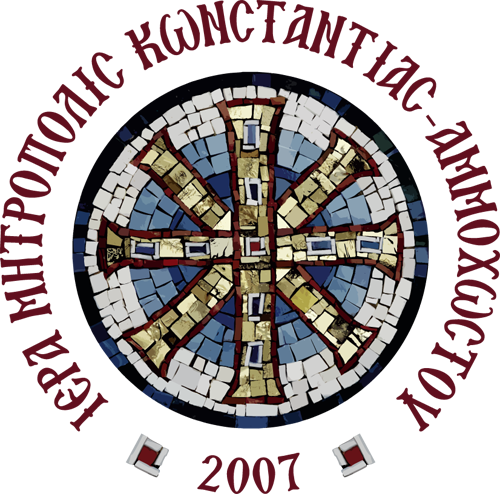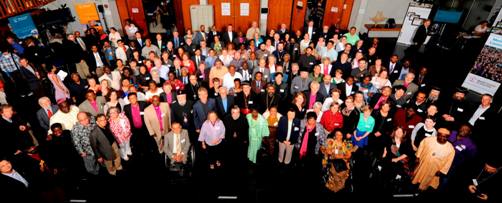ΣΥΝΑΝΤΗΣΗ ΤΗΣ ΚΕΝΤΡΙΚΗΣ ΕΠΙΤΡΟΠΗΣ ΤΟΥ ΠΣΕ (2-9/7/2014)
ΣΥΝΑΝΤΗΣΗ ΤΗΣ ΚΕΝΤΡΙΚΗΣ ΕΠIΤΡΟΠΗΣ ΤΟΥ ΠΣΕ
Γενεύη, 2 – 9 Ιουλίου 2014
Συνήλθε η πρώτη μετά τη Γενική Συνέλευση Κεντρική Επιτροπή του Παγκοσμίου Συμβουλίου Εκκλησιών στη Γενεύη, από τις 2 – 9 Ιουλίου. Η Εκκλησία Κύπρου εκπροσωπήθηκε από τον Μητροπολίτη Κωνσταντίας Βασίλειο και τη δα Σόνια Τζιοβάνι, μέλη της Κεντρικής Επιτροπής. Η Κεντρική Επιτροπή απαρτίζεται από περίπου 150 μέλη και είναι το ανώτατο διοικητικό όργανο του ΠΣΕ. Σύμφωνα με τις νέες ρυθμίσεις θα συνέρχεται ανά διετία. Στο μεσοδιάστημα θα συνέρχονται οι διάφορες Επιτροπές που έχουν καταρτισθεί για την προώθηση των προγραμμάτων του Συμβουλίου. Η δα Τζιοβάνι εξελέγη για να μετέχει στην Επιτροπή για Διεθνή θέματα, ο δε Μητροπολίτης Κωνσταντίας, εκτός της συμμετοχής του ως μέλους της Επιτροπής «Πίστεως και Τάξεως», υποδείχθηκε ως μέλος της Πηδαλιούχου Επιτροπής (Steering Committee) υπεύθυνης για την ανέγερση του νέου κτιρίου του Παγκοσμίου Συμβουλίου Εκκλησιών.
Η θεολογική συζήτηση είχε επικεντρωθεί στο θέμα, “Προσκυνηματική πορεία προς την ειρήνη και τη δικαιοσύνη” (Pilgrimage on Justice and peace). Το θέμα αυτό προέκυψε μετά τη Γενική Συνέλευση του Μπουσάν (Νότιος Κορέα), της οποίας το θέμα ήταν: Θεέ, οδήγησέ μας στην ειρήνη και τη δικαιοσύνη”. Φαίνεται ότι το Παγκόσμιο Συμβούλιο Εκκλησιών λαμβάνει περισσότερο κοινωνική παρά θεολογική διάσταση. Έτσι, όλες οι απόψεις που διατυπώθηκαν για το ανωτέρω θέμα έχουν κοινωνικό προσανατολισμό. Βεβαίως η παγκόσμια κατάσταση σήμερα επιβάλλει την ενασχόληση με κοινωνικά ζητήματα όπως οι διάφοροι πόλεμοι και συγκρούσεις, οι κοινωνικές αναταραχές, η οικονομική κρίση, η κρίση πίστεως και αξιών κ.λπ. Παρά ταύτα, αν δεν θεμελιωθεί θεολογικά το θέμα της προσκυνηματικής πορείας τότε δεν μπορεί να κατανοηθεί ούτε η κοινωνική του διάσταση.
Ο Μητροπολίτης Κωνσταντίας σε παρέμβαση του που εκτιμήθηκε από πολλά μέλη της Κεντρικής Επιτροπής, καθόρισε τα βιβλικά και θεολογικά πλαίσια της προσκυνηματικής πορείας. Μεταξύ άλλων είπε ότι η προσκυνηματική πορεία στην ιστορία ήταν παράδοση που δημιουργήθηκε με την πορεία προς τους Αγίους Τόπους ή σε άλλα ιερά προσκυνήματα. Όμως θεολογικά υπάρχουν σημαντικές πραγματικότητες που πρέπει να ληφθούν υπ´ όψη. Η πρώτη, που καθορίζει και το νόημα και την κατανόηση της προσκυνηματικής πορείας της ανθρωπότητας στο σύνολό της, είναι η πορεία του Ισραηλιτικού λαού από την Αίγυπτο στη γη της Επαγγελίας, κατά την υπόσχεση του Θεού. Εκτός της ιστορικής της διαστάσεως έχει ανθρωπολογικό περιεχόμενο και νόημα και συνδέει το παρελθόν με το μέλλον, δεδομένου ότι εικονίζει την πορεία της ανθρωπότητας μέσω «της κοιλάδας του κλαυθμώνος» ένεκα της πτώσεως και της αμαρτίας. Συγχρόνως η πορεία αποτελεί προεικόνιση και τυπολογία της νέας πορείας του νέου λαού του Θεού προς τη Βασιλεία του Θεού. Η δεύτερη θεολογική παράμετρος είναι αυτός ούτος ο σκοπός της ενσαρκώσεως του Λόγου του Θεού γιατί αυτή είναι η νέα υπόσχεση του Θεού προς τον άνθρωπο να του προσφέρει τη νέα γη της επαγγελίας, τη δική του Βασιλεία. Μάλιστα, ο ίδιος ο Θεάνθρωπος ανέλαβε την πραγματοποίηση της πορείας αυτής συμβολικά με την παραμονή του στην έρημο για σαράντα ημέρες μετά το Βάπτισμά του, όπου, όπως ο Αδάμ ζούσε με τα άγρια ζώα της ερήμου. Στην ουσία, η εν σαρκί επιδημία του Υιού του Θεού αποτελεί αφ’ εαυτής μία πορεία για την επικράτηση των δικαίων του Θεού, γι’ αυτό και αναδύθηκε σε αγώνα εναντίον του διαβόλου και όλων εκείνων που αντιστρατεύονται το θέλημα του Θεού και να προσφέρει στο ανθρώπινο γένος την πνευματική του ελευθερία. Η Τρίτη θεολογική παράμετρος είναι το γεγονός, ότι ο νέος λαός του Θεού αναλαμβάνει τη δική του προσκυνηματική πορεία. Κατά τη διάρκεια αυτής της πορείας που εγκαινίασε ο Ιησούς Χριστός, αγωνίζεται για την ειρήνη και τη δικαιοσύνη και για όλα τα άλλα χαρακτηριστικά ιδιώματα της Βασιλείας του Θεού όπως ο Χριστός τα δίδαξε στους Μακαρισμούς.
Μεταξύ των πολλών δηλώσεων που υιοθετήθηκαν είναι η αναφορά στην κατάσταση στο Ιράκ, τα προβλήματα που προκαλεί η αλλαγή άρθρου του Συντάγματος της Ιαπωνίας, στην κατάσταση των Χριστιανών στη Συρία, στα οικονομικά μέτρα του Ισραήλ εναντίον των Παλαιστινίων και την ευθύνη των Χριστιανών προς το Ισραήλ. Επιπρόσθετα, έγινε αναφορά στην παραβίαση των δικαιωμάτων των θρησκευτικών μειονοτήτων στη Σρι-Λάκα, στην κατάσταση στην Ουκρανία και άλλα.
Οι εκπρόσωποι της Εκκλησίας Κύπρου έλαβαν αντίστοιχα μέρος σε συζητήσεις στρογγυλής τραπέζης. Η δα Σόνια Τζιοβάνι συντόνισε τη συζήτηση στην Ολομέλεια που είχε ως θέμα, «Προσκυνηματική πορεία προς την δικαιοσύνη και την ειρήνη. Προωθώντας περαιτέρω το όραμα και την πολιτική της Γενικής Συνελεύσεως». Ο Μητροπολίτης Κωνσταντίας εξ άλλου, έλαβε μέρος σε συζήτηση στρογγυλής τραπέζης, όπου έγινε παρουσίαση των συγκρουσιακών καταστάσεων της Βορείου και Νοτίου Κορέας, της Νιγηρίας και του Σουδάν. Έπειτα από τις παρουσιάσεις των εν λόγω υποθέσεων από εκπροσώπους των Εκκλησιών των χωρών αυτών, ο Μητροπολίτης Κωνσταντίας κλήθηκε να δώσει τις θεολογικές συνισταμένες και διαστάσεις των ζητημάτων αυτών. Η παρέμβαση του Μητροπολίτη Κωνσταντίας ήταν η ακόλουθη στην Αγγλική.
“Through faith [they] conquered kingdoms, administered justice, obtained promises …, won strength out of weakness, became mighty in war, put foreign armies to flight”.
(Heb. 11:33-34).
- We have in front of us three very serious cases of conflicts in different regions of the world, which date from a certain period of time. The issue of the Korean Peninsula, and the conflicts of Sudan and Nigeria. We could multiply the cases. I come from a region, the Middle East, where conflicts are usual in the everyday life of the people. You are all aware of what is happening right now in Iraq and in Syria, in Egypt and the whole area of Middle East. Also my country Cyprus, a member country of the European Union, has been divided for 40 years now after it was invaded by Turkey.
- If we examine the different cases one by one we could find similarities but also big differences. We could say that there is no unique way of facing politically, socially and theologically the different cases of conflicts.
- It is clear in our mind that the Churches in their local context and the World Council of Churches facing such conflicts have a role and a mission to play. We have to be the ambassadors of peace and reconciliation. The motives for that role are:
- There are people suffering, without differentiating between Christians or other faiths.
- Unfortunately, the general feeling is that in this increasing violence, there is a persecution of Christians in many cases under many circumstances; not only in the three cases have we referred to, but elsewhere also.
- The reasons for these situations are different in many cases. In some cases we face a religious conflict, in some other cases an ethnical conflict, in some cases it’s a political one, many times we face the question of political, social and economic corruption, or we are in front of a conflict of strategic interest, gender conflicts, like in Nigeria, and so on.
- It is obvious that the Churches could not face in all dimensions the various conflicts. It is also evident that from a Church point of view, facing the different conflicts, the mode is very different from any secular organization. The Churches have the Christian ethics as an instrument for their “battle” against the injustices in the world.
- What probably we could apply as the principle in facing cases of conflict, is a general strategy of conflict management. But this has not to be impersonal one. We need to be effective in our interventions. The strategic plan we propose, which could be a kind of accompaniment pilgrimage for justice and peace is the following.
STRATEGIC PLAN
The main purpose of our involvement is of course to relief people from suffering. For this we need to find the correct ways in every situation. But from the moment that we come and say to people “we can help you in your weakness”, then, we create a special relationship with the people in need. We identify with their problem and their situation.
However we should be cautious as the people in this situation could misunderstand our capabilities and they could understand that we are able to help them in all means.
From the side of those offering any kind of help, here are three steps to follow according to the proposed strategic plan.
- The first is to have a good and correct knowledge about the situation and to discern the negative and the positive aspects. This discernment is necessary because we have to use the positive aspects as catalyzers against the negative ones.
- The second very important step is to have a clear position for the problem itself. We need to know by ourselves which has to be the solution. Otherwise we are lost in our efforts.
- The third is the decisive step concerning our actions, how can we help and what are the effective measures we can take?
Under these circumstances we can establish some ethical and theological principles. In all three steps there are many aspects we have to take into consideration.
- We need to have in mind that every single person who suffers is the image of God, called to salvation offered by our Savior Jesus Christ.
- It is important to strengthen the people in their faith. As the Hebrew Letter puts it, “Through faith [they] conquered kingdoms, administered justice, obtained promises …, won strength out of weakness, became mighty in war, put foreign armies to flight” (Heb. 11:33-34).
- The Churches are ambassadors of reconciliation. As St. Paul puts it: “All this is from God, who reconciled us to himself through Christ, and has given us the ministry of reconciliation; that is, in Christ God was reconciling the world to himself, not counting their trespasses against them, and entrusting the message of reconciliation to us. So we are ambassadors for Christ, since God is making his appeal through us; we entreat you on behalf of Christ, be reconciled to God. For our sake he made him to be sin who knew no sin, so that in him we might become the righteousness of God” (2 Co. 5:16-21).
- The Churches have to fight against any injustice and for the right of the people who suffer. “Now who is there to harm you if you are zealous for what is right? But even if you do suffer for righteousness sake, you will be blessed. Have no fear of them, nor be troubled, but in your hearts sanctify Christ as Lord. Always be ready to make your defense to anyone who demands from you an account of the hope that is in you; yet do it with gentleness and reverence. Keep your conscience clear, so that, when you are maligned, those who abuse you for your good conduct in Christ may be put to shame. For it is better to suffer for doing good, if suffering should be God’s will, than to suffer for doing evil” (1 Pt. 3:13-17).
- Concerning the forgiveness which was mention before is a very challenging issue. I have to tell you a personal experience in the purpose to show how difficult is this issue. Theologically I know that we have to forgive those they trespass against us like God forgives our trespasses against Him. But the forgiveness is directly related to the justice. Five of my closed relatives were killed when Turkey had invaded Cyprus in 1974. Now, tell me where is the place of forgiveness and where for the justice? This is one of the most difficult ethical questions for the Christian theology.

